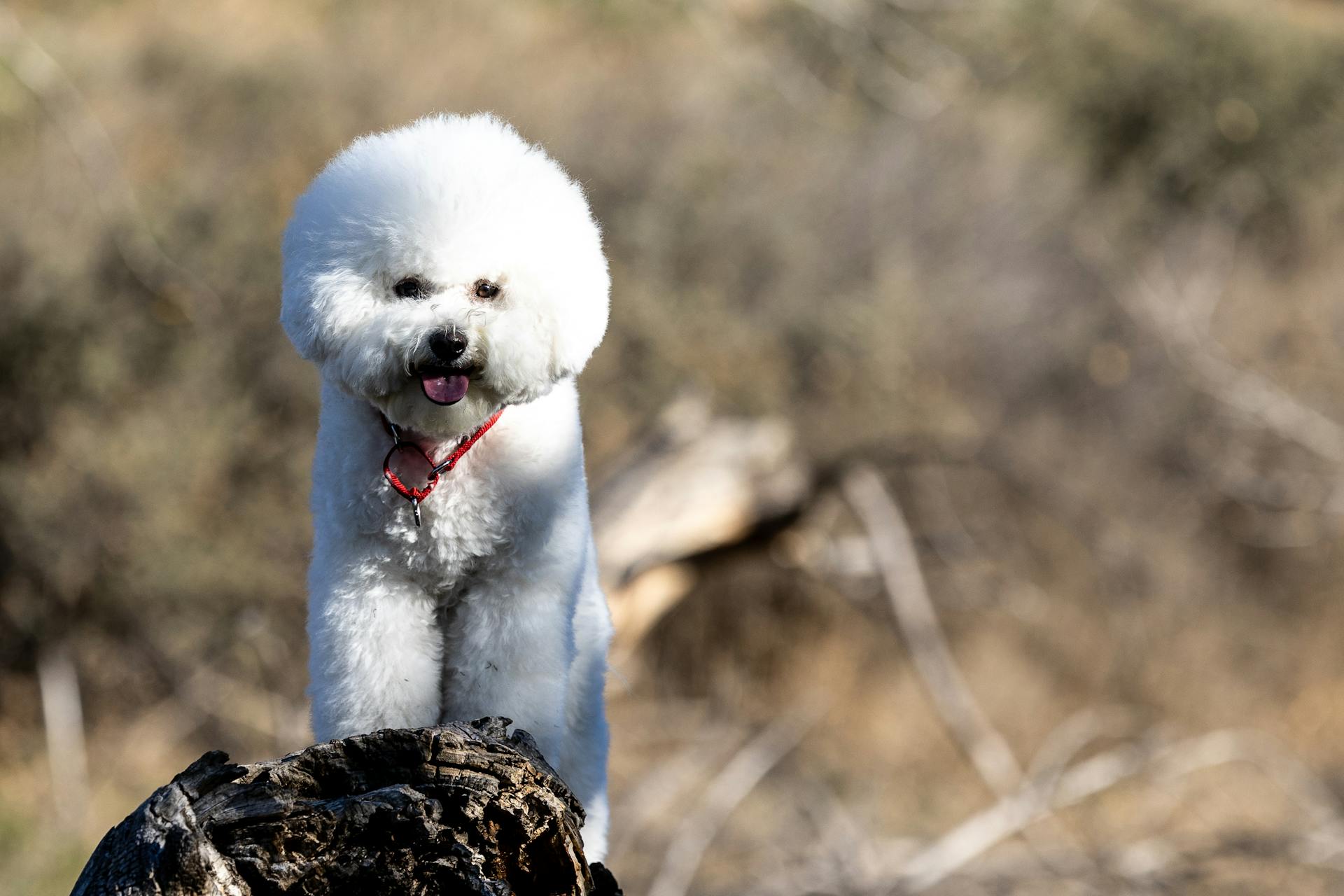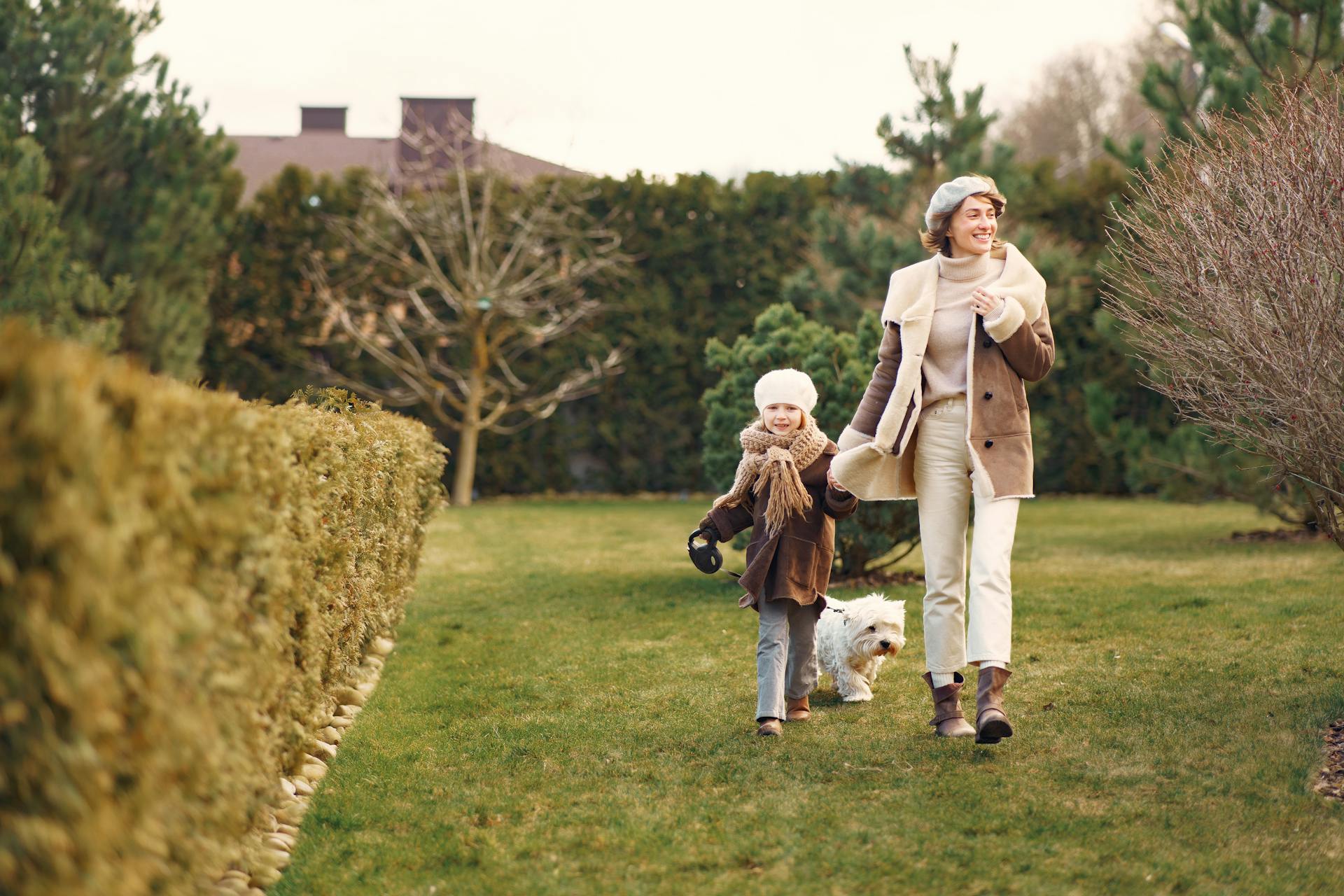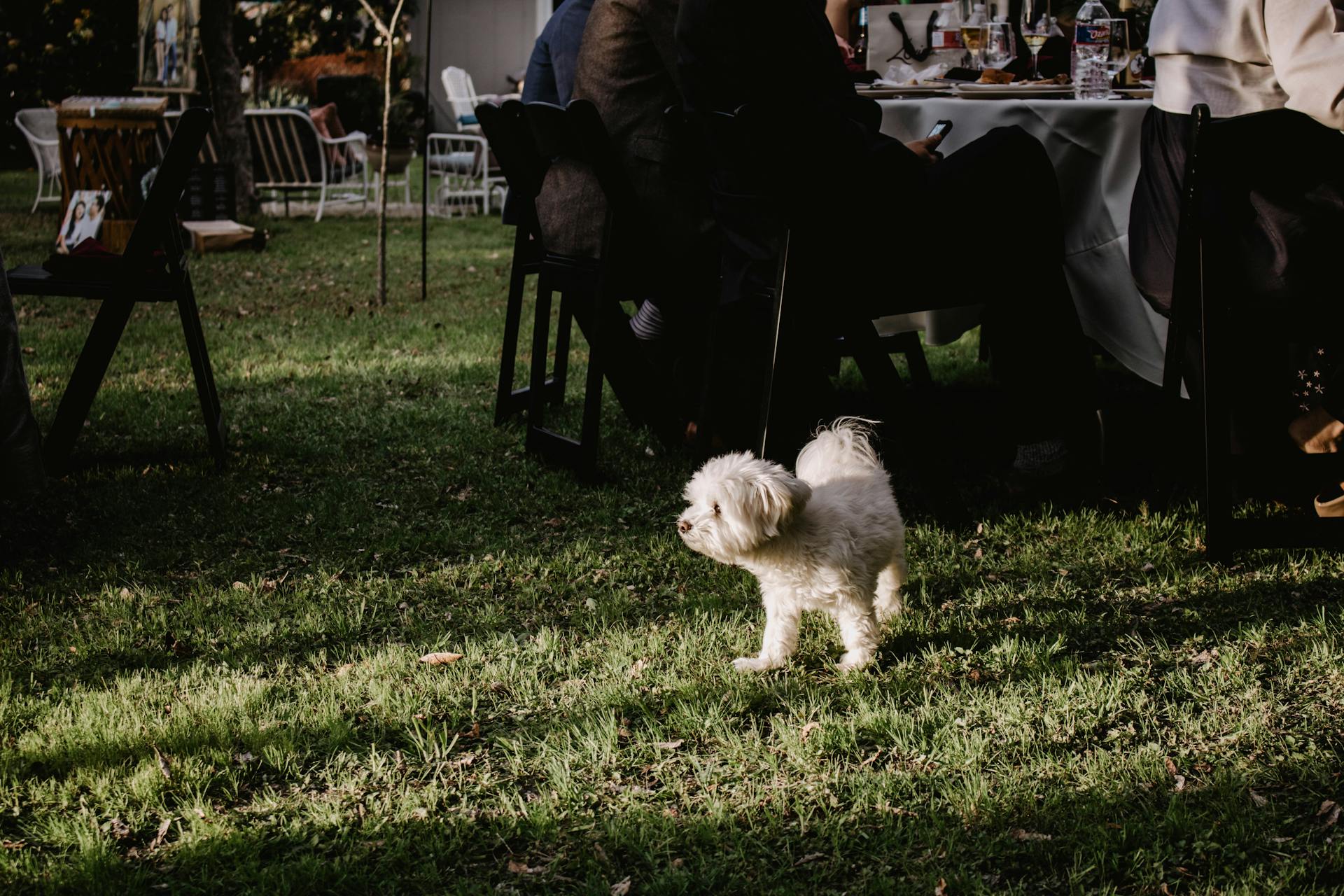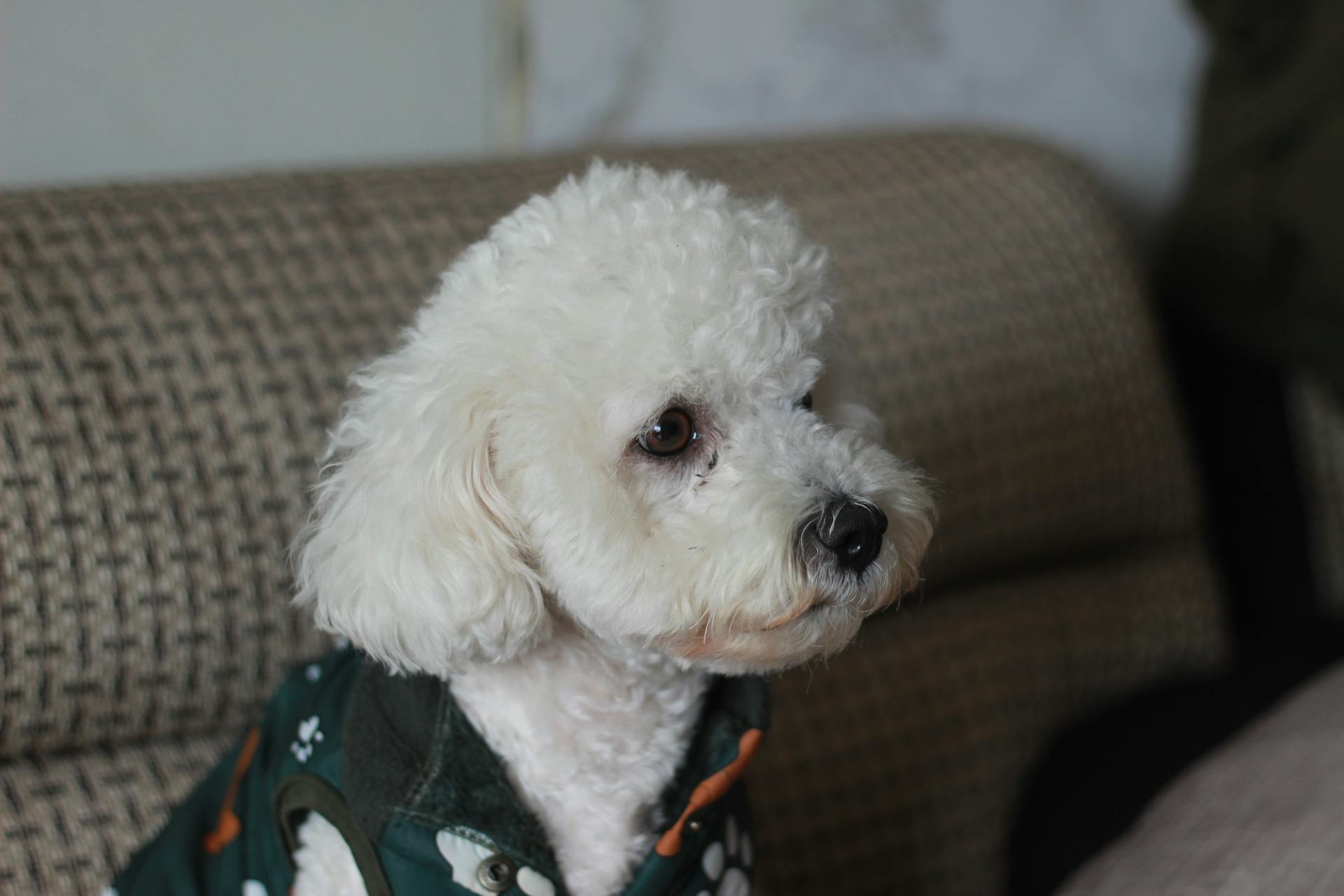
The Bichon Frise Maltese is a delightful companion that requires attention to its grooming needs. They need to be brushed daily to prevent matting and tangling of their fur.
Their small size, typically weighing between 7-12 pounds, makes them a great fit for apartment living. With proper care, they can live up to 12-15 years.
Their playful and affectionate nature demands regular interaction and exercise to prevent boredom and destructive behavior.
Physical Characteristics
Bichon Frises are small dogs with vibrant, fluffy white coats that resemble a cotton ball. They have a baby-doll face, with dark, round eyes and a black nose. Their plumed tail curves gracefully over the back, giving them a sprightly appearance.
Bichon Frises generally weigh between 12-18 pounds (5.4-8.2 kg) and stand about 9-11 inches (23-28 cm) tall.
Their size can be affected by their age, whether they're male or female, and their activity levels.
Coat and Grooming
The Bichon Frise and Maltese are both known for their beautiful, flowing coats that require regular grooming to prevent matting and tangling. Their coats are a major part of their charm, but they can be high maintenance.
The Bichon Frise has a soft, curly coat that's often described as plush and velvety, while the Maltese boasts a silky, straight coat that can feel like fine satin to the touch. Both breeds require regular and thorough grooming to keep their coats looking their best.
Daily brushing is essential for both breeds to prevent tangles and mats. The Bichon Frise requires a high-quality brush and comb, while the Maltese can get by with a gentle brush and a wide-tooth comb.
Here's a quick rundown of the grooming needs for both breeds:
Both breeds will need regular baths, but be mindful not to over-bathe as this can dry out their skin. Using hypoallergenic shampoo can help minimize the chances of skin irritation for both your dog and any allergy-prone family members.
You might like: Bichon Frise Skin Problems
Personality and Temperament
Both Bichon Frises and Maltese are known for their friendly and affectionate nature, making them excellent companion dogs for families.
They are social butterflies, fitting into family life like a dream and creating unbreakable bonds with their pet parents.
Bichon Frises are like the sunshine on a cloudy day - always ready to brighten up your life with their cheerful vibes and endless love for hanging out with their favorite humans.
Maltese dogs have a love for laps and their people, and their favorite place is to be wherever you are.
Their charming personality effortlessly captures everyone's attention, including other pups, and they're a lover, not a fighter.
Both breeds are intelligent because both the Maltese and the Bichon Frise are intelligent dogs, so no matter which parent your pup takes after, they're going to be smart.
Early socialization is vital for both breeds to ensure that they develop into well-rounded and socially confident adult dogs.
They are friendly towards strangers and generally get along well with other animals and children, but the Maltese are often more fragile, so children need to learn how to handle them gently.
Both breeds can adapt well to households with children given proper socialization, and they're not the type to sulk in the corner, preferring to be the center of attention.
You might like: Bichon Frise Not Groomed
Care and Needs
Socialization is key for both Bichon Frise and Maltese dogs to develop into well-rounded and socially confident adult dogs. Early socialization is vital to ensure they get along well with other animals and children.
Both breeds are affectionate with their families and crave attention. They are friendly towards strangers, making them great companions.
Regular veterinary check-ups are essential for catching and managing health issues early. Annual visits to the vet can help prevent problems like hip dysplasia and bladder stones.
A balanced diet and proper exercise are crucial for preventing health issues in both breeds. Daily brushing can also ward off dental problems, a common ailment in these breeds.
To prevent matting, Bichon Frise owners should brush their dog's coat daily, using a high-quality brush and comb. A mat splitter may be needed to prevent tangles.
Maltese owners should also brush their dog's coat daily to prevent tangles and mats. A gentle brush and a wide-tooth comb are ideal for working through mats.
Here's a quick rundown of the preventative care needs for both breeds:
Health and Wellbeing
Bichon Frise and Maltese dogs are generally healthy breeds, but they can be prone to certain health issues. Both breeds can live up to 12 to 15 years with proper care.
Regular veterinary check-ups are crucial in detecting and addressing health issues early on. This can help prevent problems from becoming severe.
Bichon Frises are particularly prone to hip dysplasia, a developmental condition that affects the hip joint. This can lead to arthritis or pain.
Maltese dogs are at risk of hypoglycemia, low blood sugar levels that can occur due to their smaller size. This is a condition that requires attention and care.
Both breeds are susceptible to dental problems, which can be prevented with diligent dental care, such as brushing their teeth daily. This is a common ailment in small breeds like Bichon Frises and Maltese.
Some common health issues that affect both breeds include patellar luxation, bladder stones, and progressive retinal atrophy. These conditions can impact their quality of life.
Related reading: Health Problems in Bichon Frise Dogs
Here are some common health issues that affect both breeds:
By being aware of these potential health issues, you can take steps to prevent or manage them, ensuring your Bichon Frise or Maltese lives a long, happy, and healthy life.
Training and Behavior
Training and behavior are essential aspects of owning a Bichon Frise or Maltese. Both breeds are intelligent and alert, but they have distinct personalities that require different approaches.
These dogs thrive on praise, treats, and play, making positive reinforcement a golden rule in their training. Consistency is also crucial, especially for Bichon Frises, which can be a bit stubborn at times.
Bichon Frises love to please, but they might need a little more encouragement before mastering a trick. This is where patience comes in – it's essential to be upbeat and persistent when training a Bichon Frise.
Maltese, on the other hand, are eager learners and respond well to encouragement. They benefit from a stable routine and gentle but firm training approach.
Both breeds can suffer from separation anxiety due to their affectionate nature. To mitigate this, gradual acclimatization to alone time and lots of love when their owners are present can help.
A table summarizing the key training techniques for each breed is below:
By understanding these unique traits and needs, you can develop a strong bond with your Bichon Frise or Maltese and help them thrive as a beloved member of your family.
Suitable Environments
Both the Bichon Frise and Maltese pups do best in environments where they're not left alone for long periods. They thrive in a loving home where they feel included.
Despite their small size, both breeds are perfect for apartment living. They're indoorsy types, with the Bichon sometimes being more active indoors compared to the Maltese, who may prefer snuggling on a comfy lap.
It's key that they find themselves in a setup where they're frequently in good company, receiving the companionship they crave.
Frequently Asked Questions
What is a Bichon Frise and Maltese mix called?
A Bichon Frise and Maltese mix is known as a Maltichon. This adorable hybrid combines the sweet traits of its parent breeds, making it a popular companion dog.
What is the lifespan of a Bichon Frise Maltese dog?
Bichon Frise Maltese dogs typically live for 14-15 years. They enjoy a long life, making them a wonderful companion for many years.
How big do Maltese bichons get?
Maltese bichons typically reach a height of 20-25 cm and weigh between 2-4 kg. They are a small but charming breed.
What does a Bichon Maltese mix look like?
A Bichon Maltese mix, also known as a Maltichon, has a small, well-built body with soft white fur that can be silky or velvety in texture. They have a distinctive head shape with a square muzzle and a rounded forehead.
Featured Images: pexels.com


